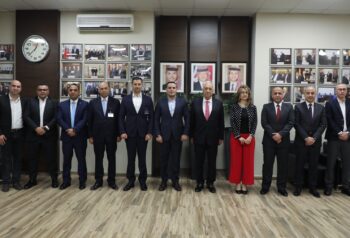
Amman: Senator Dr. Nasereddin, Chairman of the Board of Trustees of Middle East University, sponsored the completion of a training program on women and the pillars of community peace in collaboration with the Public Security Directorate. The programme encompassed a three-day period and involved the participation of 25 women representing the directorate and a range of governmental and private institutions.
This training programme represents an extension of the robust partnership between the university and the Public Security Directorate, with a focus on the pivotal role women play in the construction of a safer and more stable society.
In this context, during the graduation ceremony, which was attended by Colonel Muhammad Obaidat, Assistant Director of the Special Branch, Lieutenant Colonel Omar Khlaileh, Director of the Community Peace Centre, Prof. Salam Al-Mahadin, President of the University, Dr. Ahmad Nasereddin, Vice Chairman of the Board of Directors, and several specialists, Dr. Nasereddin emphasised that women have played a leading role in nurturing generations and instilling human values. He emphasised the necessity of focusing on their role in the present era, particularly in order to confront the contemporary challenges that threaten social peace, especially extremist ideologies.
Dr. Nasereddin emphasised the significance of empowering women across a range of sectors, underscoring that sustainable community security cannot be attained without their effective involvement in community and political decision-making processes. He urged the integration of efforts among all state institutions to ensure the genuine participation of women as partners in the formulation of solutions and the facing of challenges.
In his remarks, Colonel Muhammad Obaidat commended the strategic alliance between the Public Security Directorate and Middle East University, emphasizing its status as a model for productive collaboration in raising community awareness of women’s contributions to security issues. In addition, Obaidat stated that the conducting this programme reflects a collective awareness of the importance of unifying national efforts to address the risks associated with extremism. Furthermore, he noted that the current challenges require a deeper awareness and cohesion among all parties. By establishing a collaborative relationship between security and academic institutions, it is possible to construct a society that is equipped to counter extremism and promote the values of coexistence and dialogue.
As for the training programme, it addressed a number of key issues, including online recruitment, female recruitment, the potential risks associated with electronic games for young people, and the impact of hate speech and rumours on community peace. These challenges can be effectively addressed through unified national efforts and enhanced community awareness.